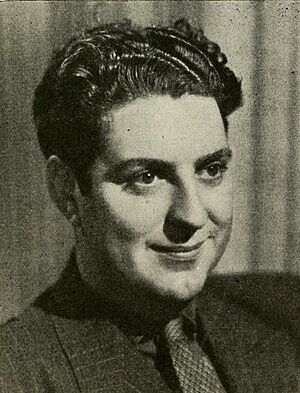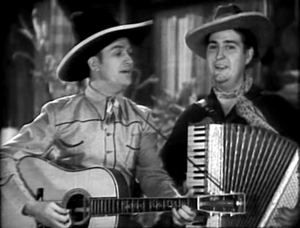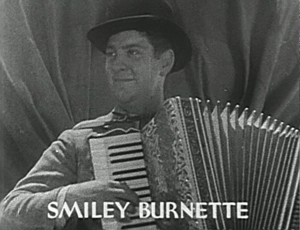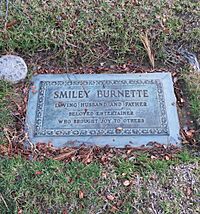Smiley Burnette facts for kids
Quick facts for kids
Smiley Burnette
|
|
|---|---|

Burnette in 1937
|
|
| Background information | |
| Birth name | Lester Alvin Burnett |
| Also known as | Smiley Burnette |
| Born | March 18, 1911 Summum, Illinois, U.S. |
| Died | February 16, 1967 (aged 55) Encino, California, U.S. |
| Genres | Country music |
| Occupation(s) |
|
| Instruments | Accordion, guitar, banjo, many others |
| Years active | 1933–1967 |
| Labels | Abbott Starday Capitol Columbia ARA Rancho |
Lester Alvin Burnett (born March 18, 1911 – died February 16, 1967) was an American country music performer. He was best known as Smiley Burnette. He was also a funny actor in Western movies, on radio, and on TV. He often played the sidekick (a helpful friend) to famous cowboys like Gene Autry and Roy Rogers.
Smiley Burnette was also a talented singer and songwriter. People say he could play over 100 musical instruments! Sometimes he even played more than one at the same time. His career lasted for four decades, from 1934 to 1967. In the 1960s, he had a regular role on the TV show Petticoat Junction.
Contents
About Smiley Burnette
Lester A. Burnett was born in Summum, Illinois, on March 18, 1911. He grew up in Ravenwood, Missouri. He started singing when he was a child. He learned to play many instruments just by listening, without ever learning to read music. As a teenager, he performed in vaudeville, which was a type of stage show with different acts. In 1929, he started working at WDZ-AM, Illinois's first commercial radio station.
Smiley got his nickname while creating a character for a children's radio show at WDZ. He was reading a story by Mark Twain called "The Celebrated Jumping Frog of Calaveras County". This story had a character named Jim Smiley. Lester named his radio character Mr. Smiley and soon started using "Smiley" as his own nickname.
His Movie Career
Smiley's big chance came in December 1933. He was hired by Gene Autry to play the accordion on a radio show called National Barn Dance. Gene Autry was a big star on this show. When movies with sound became popular, Hollywood looked for musical talent for Western films. In 1934, Gene Autry and Smiley Burnette made their first movie appearance. They were part of a band in the film In Old Santa Fe. Smiley sang and played the accordion, and the movie included two songs he wrote.
Smiley had small roles in a few more movies. Then, in 1935, he got a bigger part in a movie series called The Adventures of Rex and Rinty. That same year, Gene Autry got his first starring role in a 12-part series called The Phantom Empire. Smiley played Oscar, a funny character who made people laugh.
Later, a company called Republic Pictures became very successful with musical Western movies starring Gene Autry. In these films, Smiley Burnette played Autry's funny sidekick, Frog Millhouse. Frog was known for his floppy black hat and a special voice that sounded like a deep frog croak. Gene Autry and Smiley Burnette made 62 musical Western movies together!
By 1940, Smiley Burnette was one of the most popular Western stars. He was second only to Gene Autry in a magazine poll. He was the only sidekick among the top 10 stars. Smiley's movie horse, a white horse with a black ring around its left eye, also became famous. Its names included Black-eyed Nellie, Ring-eyed Nellie, and finally just Ring Eye.
When Gene Autry left to serve in World War II, Smiley Burnette continued to be a sidekick for other actors like Eddie Dew and Sunset Carson. He also appeared in nine movies with Roy Rogers. After 1944, he joined Columbia Pictures and became the sidekick to Charles Starrett in the Durango Kid movie series. Starrett and Burnette made 56 films together. After Starrett retired, Smiley was reunited with Gene Autry for more movies.
Singer and Songwriter
Smiley Burnette wrote more than 400 songs! He sang many of them in his movies. His famous Western song, "Ridin' Down the Canyon (To Watch the Sun Go Down)", was later sung by other artists like Willie Nelson. Other songs he wrote include "On the Strings of My Lonesome Guitar" and "Fetch Me Down My Trusty .45". He also wrote music for films like The Painted Stallion. Many singers, including Bing Crosby, recorded his songs. In 1939, his song "Steamboat Bill" was even on the Billboard country music chart.
An Inventor Too!
Smiley Burnette was also an inventor. He built some of his unique musical instruments in his home workshop. For example, his "Jassackaphone" looked like an organ with pipes and levers. He played it in the movie The Singing Cowboy.
In the 1940s, he invented something called Cinevision Talkies. This was an early home audio-visual system. Each package had a record with four of his songs and 15 slides. You could project the slides while listening to the music. He also found many clever uses for a common wire clothes hanger and showed them on a TV show.
Publicity and Promotion
Most Hollywood stars let their movie studios handle their publicity. But Smiley Burnette took charge of his own promotion. He knew how popular he was and smartly used his name and image to sell things. He started a national Smiley Burnette Fan Club, mainly for young fans. He sold signed photos and souvenirs to club members. He also made extra money by appearing in person at theaters that showed his films.
Smiley Burnette had a 15-minute radio show called The Smiley Burnette Show. He also appeared regularly on the TV show Ozark Jubilee. Later, as Western movies became less popular, Burnette appeared on many country music radio and TV shows, like Grand Ole Opry.
In the 1950s, Smiley Burnette opened a chain of restaurants called The Checkered Shirt. These were drive-in restaurants shaped like an A-frame. Two locations still exist in California today.
In the mid-1960s, he played a railway engineer named Charley Pratt on the TV shows Petticoat Junction and Green Acres.
His Passing
After filming the fourth season of Petticoat Junction, Smiley Burnette became ill. He passed away on February 16, 1967, in Encino, California, from leukemia. He was buried in Forest Lawn Memorial Park in Hollywood Hills, California.
Smiley Burnette's Legacy
Smiley Burnette gave his original hat and shirt to the Cowboy Hall of Fame in Oklahoma City in 1962. In 1971, he was added to the Nashville Songwriters Hall of Fame after he passed away.
For his work in movies, Smiley Burnette received a star on the Hollywood Walk of Fame in 1986. In 1998, he was added to the Western Music Association. In 2012, he was inducted into the Cowtown Society of Western Music Hall of Fame as a Hero.
Smiley Burnette is also mentioned in a popular country music song from 1973 by the Statler Brothers called "Whatever Happened to Randolph Scott?". The song remembers the old-time cowboy heroes.
Selected Movies
- In Old Santa Fe (1934) as Lester Burnette
- The Phantom Empire (1935) as Oscar
- The Adventures of Rex and Rinty (1935) as Jensen
- Tumbling Tumbleweeds (1935) as Smiley
- Melody Trail (1935) as Frog Millhouse
- The Singing Cowboy (1936) as Frog Millhouse
- Oh, Susanna! (1936) as Frog Millhouse
- Dick Tracy (1937) as Mike McGurk
- Under Western Stars (1938) as Frog Millhouse
- South of the Border (1939) as Frog Millhouse
- Back in the Saddle (1941) as Frog Millhouse
- King of the Cowboys (1943) as Frog Millhouse
- Roaring Rangers (1946) as himself
- The Fighting Frontiersman (1946) as himself
- Last Days of Boot Hill (1947) as Deputy
- Trail of the Rustlers (1950) as himself
- The Kid from Broken Gun (1952) as himself
- Last of the Pony Riders (1953) as himself
See also
 In Spanish: Smiley Burnette para niños
In Spanish: Smiley Burnette para niños
 | Selma Burke |
 | Pauline Powell Burns |
 | Frederick J. Brown |
 | Robert Blackburn |




